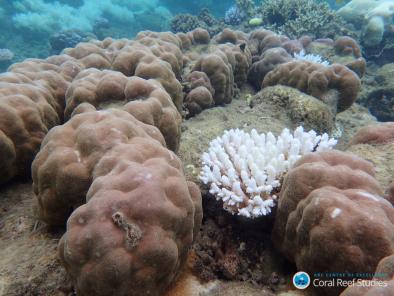Science Source
U-Th dating reveals regional-scale decline of branching Acropora corals on the Great Barrier Reef over the past century
- States that little is known about past Great Barrier Reef coral mortality before the advent of long-term monitoring (circa 1980s)
- Uses paleoecological analysis and high-precision uranium-thorium (U-Th) dating to reveal an extensive loss of branching Acropora corals and changes in coral community structure in the Palm Islands region of the central GBR over the past century
- States that in 2008, dead coral assemblages were dominated by large, branching Acropora and living coral assemblages by genera typically found in turbid inshore environments
- Finds that the timing of Acropora mortality was occasionally synchronous among reefs and frequently linked to discrete disturbance events, occurring in the 1920s-60s and again in the 1980s-90s
- Surveys conducted in 2014 revealed low Acropora cover (<5%) across all sites
- Results suggest a loss of resilience of this formerly dominant key framework builder at a regional scale
- Study implies that the management of these reefs may be predicated on a shifted baseline
Related Content
Headline

Apr 18, 2018 | Washington Post
Global warming has changed the Great Barrier Reef ‘forever,’ scientists say
Science Source
| World Weather Attribution
Great Barrier Reef Bleaching, March 2016
Science Source
| Proceedings of the National Academy of Sciences
Ocean acidification affects coral growth by reducing skeletal density
Nathaniel R. Mollica, Weifu Guo, Anne L. Cohen et al
Science Source
| PLOS ONE
Coral physiology and microbiome dynamics under combined warming and ocean acidification
Andréa G. Grottoli, Paula Dalcin Martins, Michael J. Wilkins et al


